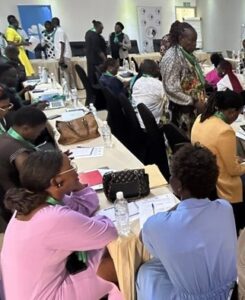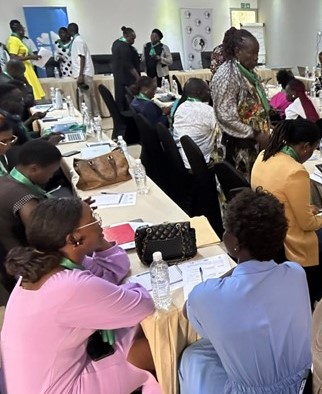
participants during the closing day of a workshop held in Juba (photo: Narumanga Jully)
.jpg
By Lodu William Odiya
The Global Voices Organization (GVO) has yesterday urged stakeholders to collaborate and share responsibility in order to domesticate and implement Maputo Protocol in South Sudan.
In a press statement read by the Organization’s Communications Assistant, Narumanga Jully emphasized strong partnership and coordination among key actors would advance women’s rights.
“We also emphasize the shared responsibility among all stakeholders involved in this consultation, including government institutions, the civil society, and affected communities, to ensure the successful domestication and implementation of the Maputo Protocol in South Sudan” she said.
However, she stated that there was still progress towards domestication and implementation, which remains slow.
“As we mark the second anniversary of the ratification, and as the country continues to undergo critical constitutional transformation, it is imperative to renew our national commitment and take concrete steps to integrate the provisions of the protocol into South Sudan’s legal policy and institutional frameworks to implement fully its provisions” she underlined.
Narumanga further highlighted her organization recognized that the Maputo Protocol provided a strong legal foundation for women’s rights across various domains, which includes political participation, education, reproductive health, and freedom from violence and harmful practices.
According to her, critical gaps still remained, which is the 35% affirmative action outlined in the revitalized peace agreement, which is yet to be fully realized, and reproductive health continues to be stigmatized, citing Women’s literacy remained among the lowest in the region.
“There is still gender-based violence, harmful norms, and systematic discrimination that still persists. Legislative delays, limited funding, and weak implementation structures continue to hinder the meaningful progress” Narumanga stressed.
Narumanga reiterated the government of South Sudan ratified the protocol to the African Charter for Human and People’s Rights on the Rights of Women in Africa, commonly known as the Maputo Protocol, in June 2023, signaling the commitment to promoting and protecting the rights of women and girls across the country.
She further commended the tireless efforts of many actors, including the CSOs, the legal experts, and the grassroots women leaders who have advanced the domestication agenda by advocating for the bills such as the anti-GBV bill, the family law bill, the inclusion of the marriageable age in the constitution, permanent constitution, the criminalization of marital rape, and the implementation of the 35% affirmative action.
“These efforts reflect a collective willingness to pool resources and work in solidarity to ensure the full realization of women’s rights in South Sudan” she said.
She stated that following the two days of productive engagement, the participant during the consultative workshop agreed on key actions which includes finalizing the national action plan for the domestication and implementation of the Makuta Protocol by December 2025.
Narumanga further added that the participants also agreed to establish a joint national reporting mechanism led by the Ministry of Gender, Child, and Social Welfare to consolidate reporting on regional and international human rights instruments, including the Maputo Protocol, the African Charter on Human and People’s Rights, the Convention on the Rights of Child, and the Convention on the Rights of Persons with Disabilities.
She underscored they also agreed to strengthen collaboration between national and state-level stakeholders through platforms such as the Gender Equality Forum to promote evidence-based policymaking and unified reporting on gender equality instruments, commitments, to also provide targeted capacity strengthening to institutions and individuals who are involved in regional and international reporting processes, ensuring alignment with global standards and obligations.
Narumanga emphasized the participants also agreed that a legal and policy reforms including the review of the transitional constitution 2011, to translate and dismantle the Maputo Protocol into local Arabic and popular languages, and continue awareness raising, including among judges, lawyers, traditional chiefs, and other community members.
The organization called on the stake holders to collaborate and prioritize the activities regarding Maputo protocol
“we call upon all stakeholders, from policymakers, legislative to traditional leaders, civil society actors, community members, to join forces and prioritize the domestication and implementation of the protocol, and the time to act is now. South Sudan women and girls deserve nothing less” she added.



